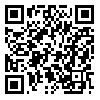BibTeX | RIS | EndNote | Medlars | ProCite | Reference Manager | RefWorks
Send citation to:
URL: http://etiadpajohi.ir/article-1-3164-en.html
Objective: The present study aimed to investigate the patterns of parental control among young substance users based on Glasser's choice theory. Method: This was a qualitative study that utilized a grounded theory approach. The population for the research included young substance users in Yazd during the winter of 2021. From this population, 10 individuals were selected using purposive snowball sampling. Data was collected through semi-structured interviews. The data was analyzed using three coding methods: open, axial, and selective coding, which ultimately led to the extraction of a paradigmatic model. Results: The results indicated the extraction of one central category, 18 main categories, and 71 subcategories. The main categories included parental anxious attachment, parents’ unpleasant childhood experiences, parents’ inability to have an independent identity, parental perfectionism, parental marital conflicts, parental susceptibility to societal and cultural pressures, financial anxieties, influence and interference from the extended family, children's financial dependency, parents' psychological issues and violation of personal boundaries, improvement of parent-child relationships, identification of supportive patterns and positive parental controls, analysis of parent-child interactions and reciprocal emotions and behaviors, development of communication and parenting skills for substance abuse prevention, family cohesion, and strengthening communication and emotion regulation skills. Conclusion: Patterns of parental control, particularly ineffective and strict controls, have negative impacts on the mental and social well-being of children. Therefore, it is essential for parents to use supportive and encouraging methods in their child-rearing processes to help their children develop an independent identity and communication skills. Additionally, educational programs for parents on managing family relationships and reducing controlling behaviors can help prevent addiction problems in young people.
Received: 2024/07/27 | Accepted: 2025/05/12 | Published: 2025/10/6
| Rights and permissions | |
 |
This work is licensed under a Creative Commons Attribution-NonCommercial 4.0 International License. |






